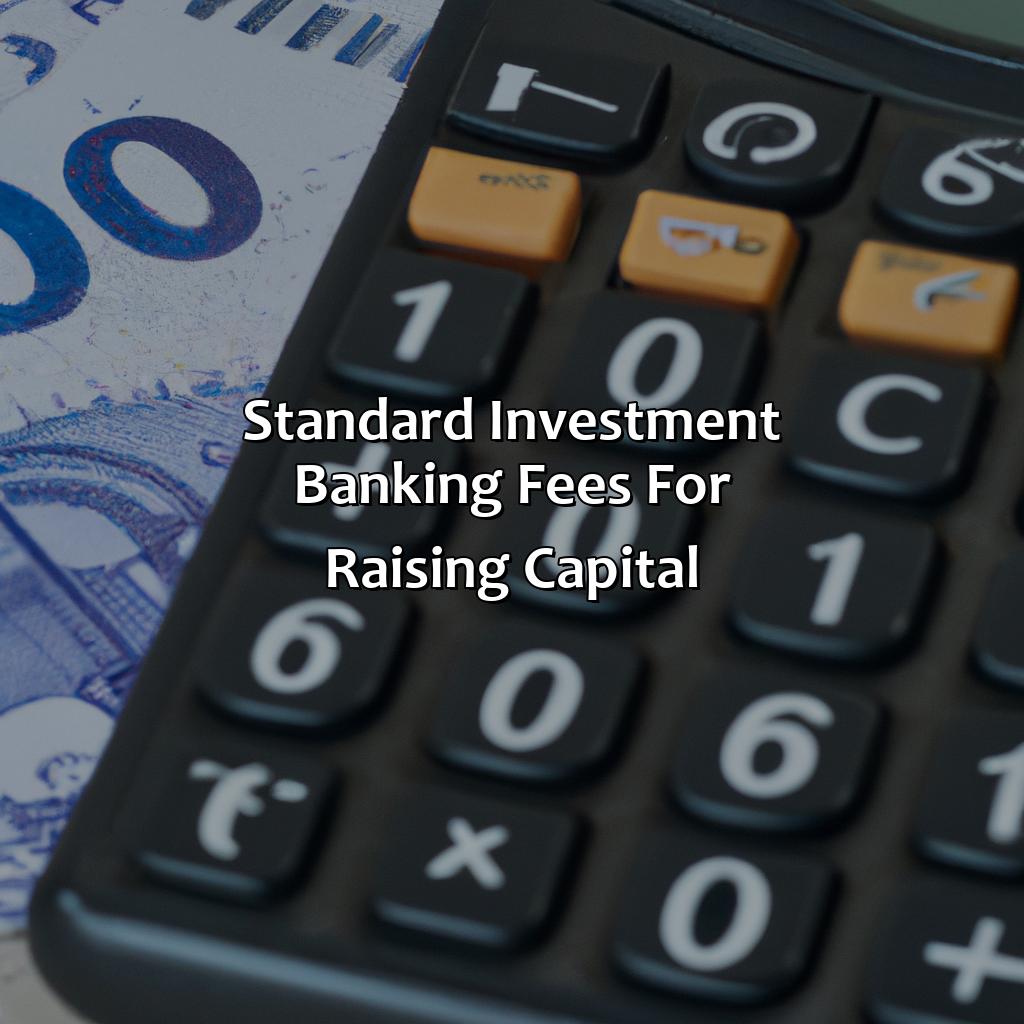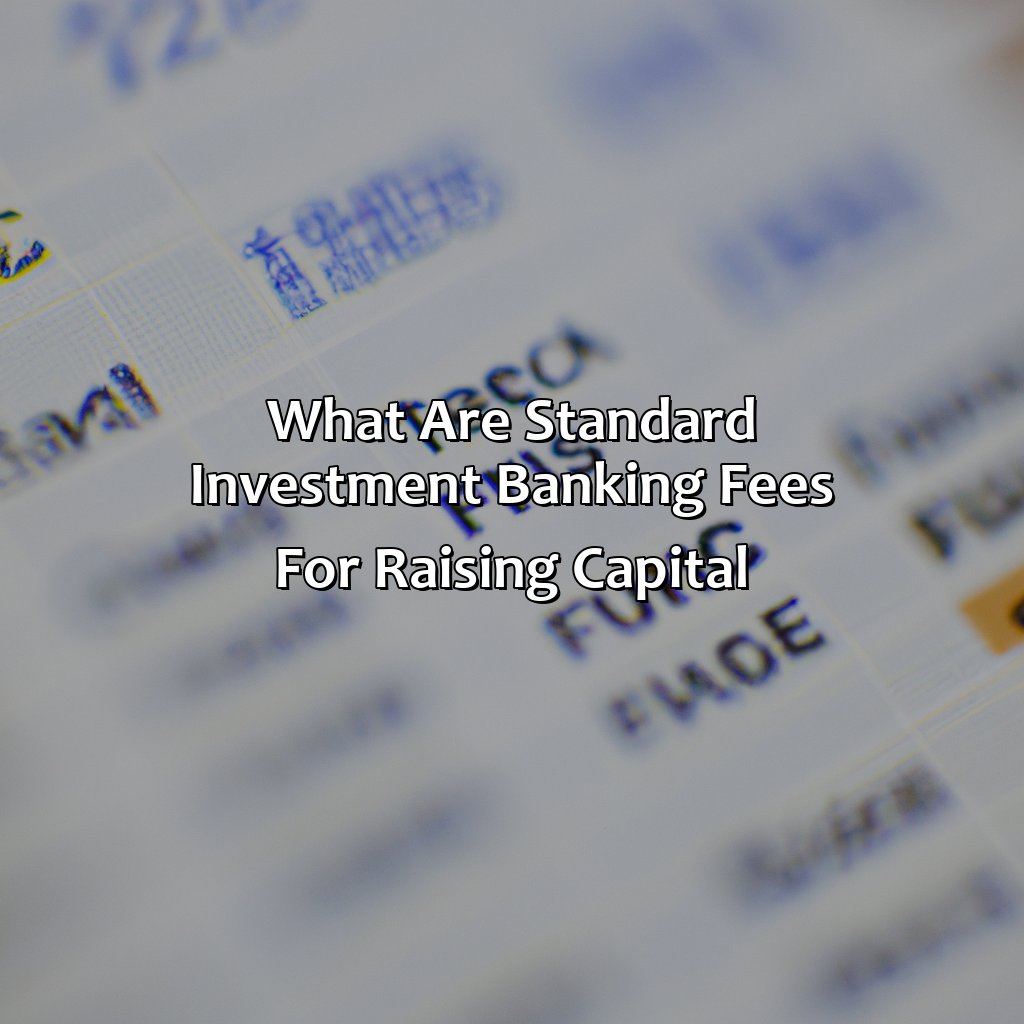What Are Standard Investment Banking Fees For Raising Capital?
Key Takeaway:
- Investment banking fees are charges levied by investment banks for providing various financial services to clients, such as raising capital or advising on mergers and acquisitions.
- Factors such as the size of the company, complexity of the transaction, and market conditions influence the investment banking fees charged by banks.
- There are three main types of investment banking fees: underwriting fees, advisory fees, and placement fees.
- For equity offerings, standard investment banking fees range from 3-7% of the total amount raised, while for debt offerings, they typically range from 1-3% of the total amount raised.
- Clients can negotiate investment banking fees by comparing offers from different banks and leveraging their bargaining power to get a better deal.
Are you looking to raise capital for your business but unsure of the investment banking fees? This article will provide insight into what standard fees you can expect. You’ll have a better understanding of how much you should budget for your capital-raising venture.
What are Investment Banking Fees?
Investment banking fees refer to the charges incurred by the clients to the financial institutions for availing their capital raising services. Investment banks offer expert advice, underwriting, and other services related to capital raising. These services come with a cost which varies depending on the structure of the deal, size of the funding, and other factors. The investment banking fees can be categorized into three types – upfront fees, success-based fees, and ongoing fees. Upfront fees are charged at the beginning of the deal, success-based fees are charged upon successful completion, and ongoing fees are charged for providing ongoing support.
The investment banking fees for raising capital vary from one deal to another. Different factors such as the size of the funding required, the complexity of the deal, and the market conditions play a vital role in determining the cost involved. The percentage of fees charged can range from 1% to 7% of the total amount of funds raised. The fees can vary for different services based on the type of offering, such as equity or debt.
Financial institutions may also charge additional fees such as legal fees, filing fees, and due diligence costs. It is essential to understand the fee structure and the terms and conditions involved before availing the services of investment bankers.
Pro Tip: It is advisable to negotiate the fee structure with the investment banking firm before signing any contracts to ensure transparency and clarity.

Image credits: retiregenz.com by Joel Jones
Factors determining Investment Banking Fees
To know your investment banking fees for raising capital, it’s necessary to understand the affecting factors. To make sure the fee is fair and precise, take into account the size of your company, how complex the transaction is, and the present market conditions. These subsections will help you get a clearer picture of the various factors that decide investment banking fees.

Image credits: retiregenz.com by Yuval Arnold
Size of Company
When it comes to investment banking fees, the size of the company plays a significant role in determining the cost. Larger companies tend to have more complex financial and operational structures, requiring a greater amount of time and resources from investment banks. As a result, investment banking fees are generally higher for larger companies compared to smaller ones.
In addition to the size of the company, other factors that influence investment banking fees include the scope and complexity of the transaction. For instance, mergers and acquisitions tend to require more extensive due diligence and negotiations, resulting in higher investment banking fees. Similarly, raising capital through equity or debt financing can also impact investment banking fees.
It is worth noting that not all investment banks charge identical fees for their services. Some may operate on a percentage-based model while others offer flat-rate pricing structures. It is essential to research different investment banks thoroughly before engaging with them to ensure that their fee structure aligns with your budget and expectations.
Transactions so complex, they make an IKEA instruction manual look like a children’s picture book.
Complexity of Transaction
The intricacy of the transaction is a cardinal factor that decides the investment banking fees. The greater the complexity, the higher the cost of raising capital and, therefore, higher fees are required to be paid. Complex transactions require more in-depth analysis, market research and other additional services during deal-making to ensure its success.
Additionally, investment bankers make a thorough evaluation of different aspects of a complex transaction like regulatory compliance, business modelling and forecasting, risk assessment etc. Such tasks demand exceptional skills and expertise from investment banks which add to their costs.
Pro Tip: To control the complexity and alleviate the costs in raising capital, engage with fewer middlemen as feasible in negotiations with buyers or sellers.
Market conditions may change, but investment bankers always find a way to make money off of them.
Market Conditions
Investment banking fees are subject to various influential factors, one of which is the current state of the market. The market conditions play a crucial role in determining investment banking fees for capital-raising due to its dynamic nature.
An upswing in demand for capital raising can lead to an increase in the fees since investment banks have more leverage during those times. During periods where a weak economy affects markets, companies looking for capital raising services may have more bargaining power, resulting in lower fees.
Apart from market trends, other variables include the complexity and size of transactions, geographical location and reputation of the involved parties. All these factors combine to determine investment banking fees.
It’s essential to understand that although there aren’t standard investment banking fees for raising capital, conducting thorough research helps businesses establish reasonable pricing expectations. Failing to consider these influential factors could result in missed opportunities or overpaid services. Therefore, it is essential to consult professionals or employ comprehensive analysis tools designed explicitly for the finance industry during this decision-making process.
Hope you have a diversified portfolio, because these investment banking fees are anything but standard.
Types of Investment Banking Fees
To comprehend the various types of investment banking fees, like underwriting fees, advisory fees, and placement fees briefly, this section will offer a overview.
Investment banking fees typically include a mix of these three kinds of fees. Each fee structure has its own exclusive features, pricing models, and cost structure, which we will examine in the subsections.

Image credits: retiregenz.com by Yuval Arnold
Underwriting Fees
Underwriting fees are a type of investment banking fees. These are the fees that an issuer pays to underwriters for selling newly issued securities to the public. Underwriting fees are calculated as a percentage of the total amount raised and vary based on the size and complexity of the offering, market conditions, and competition among underwriters.
The calculation of underwriting fees is typically based on several factors such as the size and complexity of the offering, lead underwriter’s reputation, and market demand for securities. In general, larger offerings with higher perceived risks have higher underwriting fees compared to smaller offerings with lower risks. A lead underwriter typically takes a larger fee while co-underwriters receive a lesser amount.
It is important to note that underwriting fees can also include additional expenses related to the offering such as legal and marketing costs. Additionally, if an offering is oversubscribed or undersubscribed, it can impact underwriting fees.
Pro Tip: Negotiating rates with potential underwriters can help issuers save money on underwriting fees.
When it comes to advisory fees, remember: you’re not paying for their opinion, you’re paying for their ability to make your opinion sound smart.
Advisory Fees
Investment bankers charge fees for their services, including advising clients on mergers and acquisitions. These advisory fees typically vary based on the size and complexity of the transaction, with larger deals commanding higher fees. The fees may also be structured as a percentage of the total transaction value or a flat fee. Additionally, there may be additional fees for due diligence, regulatory compliance, and other specialized services.
It is worth noting that investment banking fee structures are highly negotiable and can vary significantly from one transaction to another. Clients should carefully review all proposed fees and negotiate to ensure they are reasonable and aligned with industry standards.
According to a report by McKinsey & Company, the average advisory fee in 2019 was 1.1% of the deal value, down from 1.2% in 2015.
Placement fees are like pay-per-view for investors, except they don’t get to watch anything exciting, just the boring paperwork.
Placement Fees
When arranging for outside investment, companies often rely on investment banks to help secure funding. One of the services provided by such banks includes assisting with the placement of securities through an underwriting agreement. Placement is also known as distribution, and fees charged for this service are referred to as “Distribution Fees.” These charges cover the costs incurred by the bank during the distribution process.
The Distribution fees usually include compensation for risk associated with placing new stock or bonds, charges for managing getting financial statements audited, and any additional regulation required assistance. Placement fees vary depending on various factors like The type of placed security (preferred or common stock, bond), size and complexity of offering package, the skill level of bankers involved in negotiating deal terms.
It’s worth noting that throughout this process, many other investment banking fees may be levied in addition to these placement/distribution fees. Advisory services fees will offer a set of expert advice aiming at providing valuable suggestions regarding possible investments and useful guidance about potential risks associated with them in exchange for a separate fee.
According to Investopedia, Investment Banks earn billions per year from clients when it comes to equity and debt offerings.
Why pay for a therapist when you can just pay investment banking fees for the same amount of emotional distress?
Standard Investment Banking Fees for Raising Capital
To get a handle on fees for capital raising with equity and debt offerings, let’s dive into the solutions. Have a look at what the sub-sections have to offer!

Image credits: retiregenz.com by Adam Jones
Equity Offerings
Equity offerings refer to the process of raising capital by selling shares of a company to investors. It is a type of funding that allows companies to access additional funds while maintaining control over their operations.
In this process, investment banks play a crucial role by acting as intermediaries between the company and investors. They provide the necessary advice, support and expertise required to ensure a successful equity offering. Investment banking fees for equity offerings can vary depending on factors such as the size of the offering, complexity of the transaction and level of service provided by the investment bank.
It is important for companies considering an equity offering to be aware of the standard investment banking fees that they may incur. These typically range from 5% to 7% for smaller transactions, with larger deals often resulting in slightly lower fees due to economies of scale.
Pro Tip: Companies should carefully consider both the potential benefits and costs associated with an equity offering before proceeding, and seek expert advice from a reputable investment bank with experience in their specific industry.
Nothing screams ‘I’m in debt’ like a company’s need to raise capital through a debt offering, but hey, at least they can afford the investment banking fees.
Debt Offerings
Debt offerings refer to the issuance of various forms of debt securities by a company, government, or organization to raise capital. These debt securities can come in the form of bonds, notes, or other financial instruments that give investors a fixed return on their investment over a set period.
When companies need to raise capital through debt offerings, they often turn to investment banks for assistance. These investment banks help them structure the debt offering and find potential investors who may be interested in purchasing the securities. The fees charged by investment banks for these services vary depending on the size and complexity of the offering.
In addition to structuring and marketing the offering, investment banks also play an important role in underwriting it. This means that they agree to buy any unsold securities at a set price, reducing the risk for the issuer and providing investors with greater confidence in the offering.
If you are considering raising capital through a debt offering, hiring an investment bank can be an excellent way to ensure its success. While there are costs associated with working with these institutions, they can offer invaluable expertise and connections that can help you reach your fundraising goals. Don’t miss out on this opportunity to elevate your business — work with an investment bank today! Negotiating investment banking fees is like playing poker with a blindfold on – you never know what you’re going to get.
Negotiating Investment Banking Fees
Negotiating Fees with Investment Bankers
When negotiating with investment bankers, it is crucial to establish clear objectives and communicate them effectively to ensure that both parties are on the same page. A good understanding of the services that the investment bank will provide and the associated fees is necessary to come to a mutually beneficial agreement.
It is important to note that investment banking fees vary depending on the services rendered, the size of the transaction, and the complexity involved. Therefore, it is crucial to negotiate fees based on the specific needs of your business. This can involve negotiating fixed fees or performance-based fees that are tied to achieving specific milestones.
In addition to negotiating fees, it is also important to consider an investment bank’s reputation and experience in the industry. This can help ensure that you are working with a reputable and knowledgeable partner who will help you achieve your goals.
A true fact, according to Wall Street Oasis, is that investment bank fees for capital raising typically range from 5% to 7% of the total amount raised.

Image credits: retiregenz.com by Harry Arnold
Some Facts About Standard Investment Banking Fees for Raising Capital:
The standard investment banking fee for raising capital is typically 7% of the total amount raised. (Source: Wall Street Oasis)
This fee can vary depending on the complexity of the deal and the reputation of the investment bank. (Source: Investopedia)
Investment banks may also charge additional fees for services such as due diligence, marketing the offering, and underwriting. (Source: The Balance)
Some companies may negotiate a lower fee with their investment bank based on their relationship or the size of the deal. (Source: Forbes)
It is important to carefully review and negotiate investment banking fees before entering into an agreement. (Source: Entrepreneur)
FAQs about What Are Standard Investment Banking Fees For Raising Capital?
What are standard investment banking fees for raising capital?
Standard investment banking fees for raising capital can vary widely depending on the size and complexity of the deal. In general, these fees can range from 1% to 7% of the total capital raised, with the average fee being around 3%.
What factors affect investment banking fees?
Several factors can affect investment banking fees, including the size and complexity of the deal, the level of competition among investment banks, and the reputation and experience of the investment bank. Deals that involve more risk or uncertainty may also command higher fees.
How do investment banks typically structure their fees?
Investment banks typically charge a combination of upfront fees and success fees. The upfront fees are paid regardless of whether the deal is successful, while the success fees are contingent on the successful completion of the deal. Success fees are typically a percentage of the capital raised, and can vary depending on the level of risk and complexity involved.
Are there any other fees that investment banks may charge?
Yes, in addition to the standard investment banking fees, there may be other fees associated with raising capital, such as underwriting fees, due diligence fees, and legal fees. These fees can add up quickly, so it’s important to have a clear understanding of all the costs involved before moving forward with a capital raising effort.
Is it possible to negotiate investment banking fees?
Yes, it is often possible to negotiate investment banking fees, especially for larger deals. However, it’s important to approach fee negotiations carefully and to be prepared to justify any proposed changes. A good relationship with the investment bank can also be helpful in negotiating better fees.
What are some alternatives to using an investment bank to raise capital?
There are several alternatives to using an investment bank to raise capital. These include crowdfunding, peer-to-peer lending, and private equity firms. However, these options may not be appropriate for all businesses and may come with their own set of fees and requirements.
 Checkout this IRS Loophole
Checkout this IRS Loophole 
